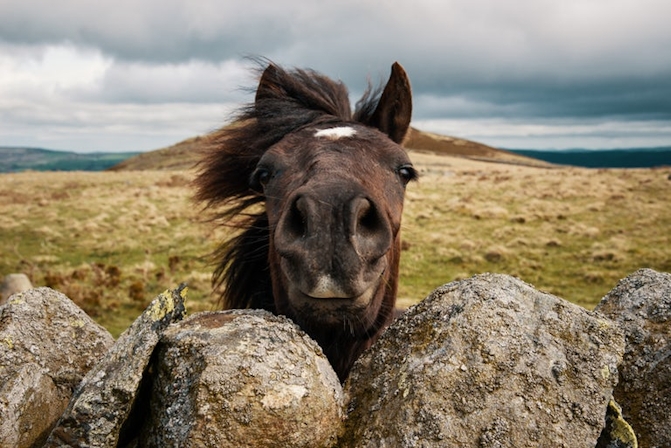
Photo by Carol Farneti-Foster/Getty Images
Here’s Everything You Wanted To Know About Animals Getting High On Weed
Do our furry friends get high? Should we give them cannabis? Here's our complete guide to animals and weed.
From stoned spiders to epileptic dogs, cannabis has a wide variety of effects on the animal kingdom. While it is never recommended to share your stash with your pet, some creatures go to some surprising lengths to get lifted.
In case you were wondering about how cannabis and other intoxicants affect your furry (and sometimes scaley) friends, you’ve stumbled on the right page. Here’s everything you’ve ever wanted to know about animals getting high on weed.
Can Dogs Get High?
Yes! Dogs can get high on cannabis, but the plant does not affect a dog in the same way that it does a human. Humans enjoy the euphoric and intoxicating properties of cannabis. As humans, we have developed a unique part of your brain that enables conscious thought.
This part of the brain is called the prefrontal cortex. Unique to the human species, the prefrontal cortex is responsible for rational thinking. So, if you’ve taken a big bong rip, it’s the prefrontal cortex that allows you to recognize what you’ve done and use rational logic to help yourself stay calm and understand your experience.
Dogs don’t have a prefrontal cortex. They’re all emotion and primal drive. If you give your dog psychoactive cannabis, your dog is not going to be able to rationally understand what is happening.
So, if your dog has a bad experience or becomes anxious, or has trouble walking because of cannabis, the dog will not be able to understand what is happening to its body. Similar to putting a dog on anesthesia for a veterinary procedure, the dog may initially act goofy or seem to be enjoying themselves.
Like anesthesia, however, cannabis is more of a medicine for dogs than it is a recreational activity.
Just like people, when marijuana is ingested, the THC metabolizes in the liver. It is converted to 11-hydroxy-THC which results in a more intense high than smoking. The size of the dog and their weight will alter the high depending on how much they eat.
Dogs can also get high off of marijuana by second-hand smoke. Again, the dog’s size determines how high it will get, as well as the concentration of smoke and how long it is exposed to the smoke.
Is Getting Dogs Stoned Safe?

Photography by Kaya Blaze for Herb
Many consumers try to get their dogs high by blowing into their pet’s nose or ears. This smoke, however, may cause harm your pets, even if it doesn’t seem like any harm is being done. There is evidence that second-hand cannabis smoke is harmful to animals.
For example, a study published early in 2018 found that it took up to 90 minutes for rodents to fully recover to healthy levels of blood flow throughout the body after exposure to cannabis smoke. By comparison, it only took 30 minutes for blood flow to recover after exposure to tobacco smoke.
That being said, the lethal dose of THC in dogs is quite high. A review published in Topics of Companion Animal Medicine sites that it takes a minimum of three grams of THC per kilogram of body weight for a dog to fatally overdose.
The review also states, however, that some deaths have been seen in dogs who got into their owner’s concentrate collection or helped themselves to their owner’s stash of THC-infused edibles. While often nonlethal, these high doses of THC can cause problems in dogs.
Some research suggests that as little as 66 milligrams of THC may cause convulsions in dogs.
Effects of Marijuana on Dogs
Many consumers find it humorous to share their stash with their dog. While there is emerging evidence that some types of medical cannabis may be beneficial to dogs, the plant can also cause some severe and life-threatening reactions if the dog has eaten too much THC. A dog that has accidentally eaten an edible or gotten stoned in some other fashion can experience some concerning symptoms, including:
- Tremor, shaking;
- Nausea and vomiting;
- Drooling;
- Clumsy gate, tripping, or dragging feet;
- Lethargy,
- Excessively low heart rate;
- Lowered body temperature;
- Lowered blood pressure;
- Seizure.
So, it is true that dogs can get high. Most of the time, if they ingest a small amount, the side effects are short-lived. But, should you feed your dog a tray of weed brownies, or blow smoke in their face? No. And no, we do not recommend that healthy dogs get high. But, if your dog or other pet is suffering from a chronic condition, it may be worth talking to your vet about the option of medical marijuana or CBD hemp supplements.
Medical Marijuana For Dogs
As more and more humans use marijuana to aid chronic illness, pet owners are turning to medical marijuana for dogs. Unfortunately, the science on the topic is a little behind the times. Emerging research, however, is promising. A 2018 study published in Frontiers in Veterinary Science found that treating dogs with two milligram s of CBD per kilogram of body weight successfully eased pain and appeared to improve the quality of life for dogs with osteoarthritis.
Epilepsy is another area of interest in veterinary medicine. Back in 2017, the American Kennel Club announced that it will be funding a large-scale clinical trial on CBD treatment for canine epilepsy conducted by researchers at Colorado State University. While the trial is still underway, the research team announced promising preliminary data in the summer of 2018. Amazingly, 89 percent of the dogs receiving CBD treatment experienced a reduction in seizure frequency, Colorado State University reports.
In humans, CBD supplementation is used as a way to calm anxiety, fight stress, and ease pain. Medicines that contain CBD are also already available to human patients with epilepsy and multiple sclerosis. While data on medical cannabis for pets is sorely lacking, many companies are already inventing products that meet consumer demand for pet-friendly CBD.
Brands like CBDistillery, CBDfx, and other big names in the industry have their own lines of pet products while there are other brands that only craft CBD products for pets.
If you want to treat your furry friend, check out this list of the best CBD oils for dogs!
Can Cats Get Stoned?

Photography by Josh Couch via Unsplash
The short answer? Yes, cats can get stoned. Cats, like all vertebrates, have cannabinoid receptors. Vertebrates are animals that have a backbone. It is the presence of cannabinoid receptors and an endocannabinoid that enables animals to respond to the intoxicating effects of THC.
Earlier in 2018, a case study published by Polish veterinarians found that a cat exposed to secondhand cannabis smoke tested positive for THC and THC metabolites in the bloodstream. This is a sign that cats not only respond to THC but also metabolize the compound similarly to humans.
But, just because a cat can respond to cannabis doesn’t mean that getting your furry friend high is a good idea.
Is Getting Cats High Safe?
Cats might go crazy for catnip, but cannabis is a different story. Sure, the felines are notorious for chomping on seedlings and nibbling at recently rooted cannabis clones. But, marijuana smoke, concentrates, and edibles are a different story.
According to the American Society for Prevention of Cruelty to Animals (ASPCA), cannabis is toxic to cats, dogs, and horses. Like dogs, cats do not have the prefrontal cortex needed to rationally understand their psychoactive experience.
Instead, the plant may produce wide-ranging neurological effects that may be uncomfortable and perhaps even dangerous for your furry friend.
Unlike dogs, the lethal limit of THC for cats has not been established. Yet, veterinarians have concerns regarding high-dose concentrates and edibles. Fresh cannabis plants and dried flower do not contain high doses of THC.
More potent cannabis preparations, however, may cause seizures in the worst-case scenario. An old case study published back in 2002 reported that one cat did die after accidental cannabis consumption, but the final verdict suggested that the cat likely consumed multiple different substances. Still, the animal died of heart failure.
Overall, however, the herb is not often fatal to animals. Fortunately, the side effects of mild to moderate cannabis intoxication are typically short-lived. In general, the side effects of accidental cannabis intoxication in animals last around 72 hours.
Effects Of Marijuana On Cats
Unlike dogs, the exact signs of cannabis intoxication are not as well-researched in cats. Still, the herb can have a potent effect on your feline friend. As per case studies and the ASPCA, here are the possible effects of marijuana on cats:
- Agitation, aggression;
- Rapid heart rate;
- Low blood pressure;
- Lethargy/ Sedation;
- Clumsy gate, difficulty walking;
- Dilated pupils, red eyes;
- Vomiting;
- Seizure;
- Coma.
These side effects are associated with psychotropic THC, which most consumers avoid giving to their pets. Unfortunately, little research has been conducted regarding cats and CBD. Though, the California Veterinary Medicine Board has tagged CBD as a potential medicine to watch pending changes to the legal status of CBD by the American federal government.
Medical Marijuana For Cats
When it comes to medical cannabis for animals, dogs are stealing the show. There is no doubt that medical cannabis is of serious interest to veterinarians, particularly for epilepsy and pain-related conditions that decrease the quality of life for our furry friends.
Unfortunately, however, there is even less research on medical cannabis for cats than there is for dogs. Many of the medicines prescribed to dogs can also be given to cats in similar dosages.
One thing is certain, though. When it comes to medical marijuana for cats and other pets, opting for CBD over THC appears to be the safer choice. Regardless, however, it is important to use caution if experimenting with CBD products for your cat.
Cats and dogs are two distinct species, and while they share many common medicines, there is always the possibility of a negative reaction. Without further research on the topic, it’s hard to say whether or not CBD will benefit a cat in the same way it seems to benefit dogs.
Can Horses Get Stoned?

Photo by R A Kearton/Getty Images
It’s a fact: horses can get stoned. Like cats and dogs, horses have an endocannabinoid system that enables them to experience the effects of cannabis. Though, it is not recommended to give horses psychoactive THC.
The ASPCA considers psychoactive cannabis a toxin to horses, though little research has been done on the topic. The ASPCA suggests that psychoactive cannabis may produce some of the same negative side effects in horses that it does in other animals—staggered gate, lethargy, anxiety, and changes in blood pressure and heart rate.
According to the dated toxicology report circa 2002 mentioned above, there is potentially one horse death that occurred after cannabis exposure. This is odd, considering that the average horse weighs between 840 and 2,200 pounds. In the case study, the horse passed away from colic, which is a common occurrence in horses when they experience a change in diet.
While it is unclear whether or not cannabis had anything to do with colic in this particular horse, it is probably wise to avoid giving your horse a psychoactive plant that produces an unknown effect on the large yet sensitive animals.
Medical Marijuana For Horses
While getting your horse stoned for the hell of it may not be such a good idea, there is a growing demand for research on medical marijuana for horses. Unfortunately, however, there is very little scientific information on how horses respond to the medicinal herb.
Veterinary research has favored dogs when it comes to testing the effects of cannabis medicines, so not much is known about how non-intoxicating compounds like CBD affect the herb. But, that hasn’t stopped innovative companies from creating their own CBD supplement lines for horses.
Here’s our selection of the best CBD products for horses.
Can Cows Get Stoned?
At this point, you may have guessed the answer—yes, cows can get stoned! Cows have an endocannabinoid system like other vertebrates, meaning that they can respond to THC and other cannabis compounds.
In fact, researchers are currently studying the ways in which the endocannabinoid system may play a part in the breeding process of cows. As with all other animals, however, lighting up with your cows is not recommended.
Can Spiders Get Stoned?
As it turns out, spiders can be affected by a wide variety of drugs, including cannabis. This notion has been confirmed by NASA scientists, who subjected spiders to a number of different substances back in the 1990s.
Spiders under the influence of marijuana, it seems, have a difficult time completing their webs. In fact, their webs look down-right haphazard. Though, it’s worth mentioning that webs built by stoned spiders were substantially more intact than webs built by spiders doped up on sleeping pills.
Can Fish Get Stoned?
Fish can get stoned, too! In fact, zebrafish are sometimes used as animal models when scientists study the endocannabinoid system. Exactly what does a stoned fish do, though? Well, back in 2017, Lebanese researchers decided to test out the effects of cannabis on Nile tilapia to see if the psychoactive herb would help the aquatic creatures relax. So, the researchers laced some fish food with cannabis oil and waited to see what would happen.
The big result? Nothing. There was no evidence of the fish calming down. Instead of relaxing, cannabis oil seemed to speed up the metabolism of the tilapia. This answers the question: what do fish do when they’re high? Apparently, chow down and that’s about all. This is not ideal for fish farmers, since stoned fish cost more to feed.
Can Flies Get Stoned?
Sadly to say, flies seem to have missed out on the endocannabinoid lottery. Flies and other insects are among the only animals which do not have cannabinoid receptors. Without cannabinoid receptors, you can’t get high.
Animals That Love Getting High

Photo by Tanja Esser / EyeEm/ Getty Images
Did you know that humans aren’t the only species in the animal kingdom that enjoys altering their state of mind? Well, it turns out that many of the coolest animals occasionally dabble into some recreational drugs. Whether they consume these substances on purpose after becoming addicted hasn’t been figured out yet, but hey, it’s still pretty rad. Here are a few animals that are known in the scientific community for seeking out mild-altering drugs in nature:
Jaguars
Get ready for catnip on steroids. These ginormous jungle cats enjoy munching on a hallucinogenic plant called Banisteriopsis caapi. This vine is one of the primary ingredients for ayahuasca. What’s in this plant? Dimethyltryptamine, more commonly known as DMT.
Jaguars use this vine to aid in cleaning out their digestive system which often results in vomiting. But the hallucinogenic properties of the plant begin before the cleanse is finished. It is speculated this plant heightens the senses of the big cat, while also stimulating mild hallucinations.
Bees
In the busy lifestyle of a bee, many are not cut out to work so hard for little reward. In the social hierarchy of bees, there are classes of bees that are considered alcoholics. They seek out fermented liquids produced by rotting fruit all over their territory. After enjoying the alcohol, these bees may fly less, socialize less, and are even more aggressive. If they manage to stay alive at all, at least.
Bighorn Sheep
High up in the Rocky Mountains in Canada, there is a certain type of rare narcotic lichen that grows upon rocks that can induce psychedelic effects. And being some of the only land animals up at these altitudes, bighorn sheep go out of their way to find this unusual food.
Lichens are a unique organism that combines algae and fungi into one particular entity. Several different types of lichen produce psychotropic effects. Considering that lichens grow in some of the most inhospitable places on earth, these Bighorn sheep have just the knowledge and endurance to find these mind-altering entities and enjoy the ride.
Capuchin Monkey
These jungle dwelling cousins of ours have found a way to protect themselves from infectious bugs and at the same time, having a grand old time under the influence of narcotics. A certain type of millipedes squirt out a poisonous liquid when they feel threatened, and the Capuchins enjoy spreading these psychotropic secretions all over their body. It proceeds to get the monkeys high and protect them at the same time.
Wallaby
Wallabies are small kangaroo-like creatures native to Australia. As it turns out, the adorable marsupials have a knack for breaking into opium farms in Tasmania. After feasting on the narcotic plants, the wallabies reportedly run in circles until they crash. Poppy farmers mentioned to BBC that they “see crop circles in the poppy industry from wallabies that are high.”
Reindeer
Ever wonder where the story of Santa and his reindeer came from? Some radical researchers speculate that it might come from munching on a few too many—or just enough—magic mushrooms. The red and white-dotted arctic species Amanita muscaria has historically been munched on my reindeer and local alike, creating potent hallucinations and a down-right psychedelic experience.
Herb Recommended Products:
READ MORE










